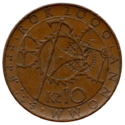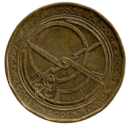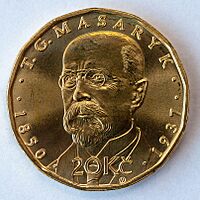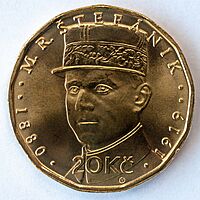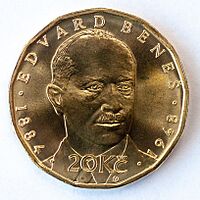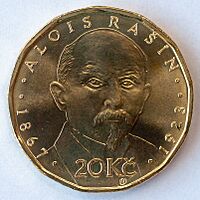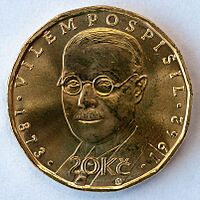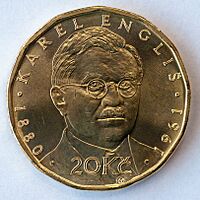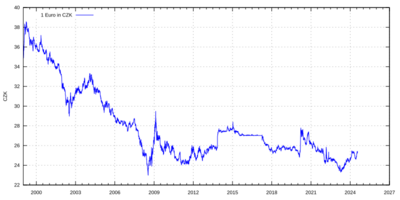Czech koruna facts for kids
Quick facts for kids Czech koruna |
|||||
|---|---|---|---|---|---|
|
|||||
| ISO 4217 Code | CZK | ||||
| User(s) | |||||
| Inflation | 2.0% | ||||
| Source | Czech Statistical Office, March 2024 | ||||
| Method | CPI | ||||
| Subunit | |||||
| 1⁄100 | haléřa | ||||
| Symbol | Kč | ||||
| haléřa | h | ||||
| Plural | The language(s) of this currency belong(s) to the Slavic languages. There is more than one way to construct plural forms. See article. | ||||
| Coins | |||||
| Freq. used | 1 Kč, 2 Kč, 5 Kč, 10 Kč, 20 Kč, 50 Kč | ||||
| Banknotes | |||||
| Freq. used | 100 Kč, 200 Kč, 500 Kč, 1,000 Kč, 2,000 Kč | ||||
| Rarely used | 5,000 Kč | ||||
| a) The haléř is still used for accounting purposes (e.g., financial reports). | |||||
The koruna (say "koh-ROO-nah"), also known as the crown, is the money used in the Czech Republic. Its symbol is Kč and its international code is CZK. It has been the official money since 1993. The Czech Republic is part of the European Union. This means it is expected to start using the euro someday.
The word koruna means "crown" in Czech. One koruna used to be divided into 100 hellers (say "HAH-lehrz"). Hellers were small coins, but they are no longer used. The smallest coin you can find now is 1 Kč.
Contents
History of the Czech Koruna
How Czech Money Began
The story of the koruna started way back in 1892. Before that, people in the area used a currency called the gulden. The new money, called the Austro-Hungarian krone, replaced the gulden. It was worth half as much as the old gulden. This is why the 10 Kč coin was sometimes called a "fiver" in the past!
Money After World War I
After Austria-Hungary broke up in 1918, a new country called Czechoslovakia was formed. It decided to keep the name "koruna" for its money. In the late 1920s, the Czechoslovak koruna was one of the strongest currencies in Europe.
During World War II, when the Czech lands were taken over, their money was made weaker on purpose. After the war, the Czechoslovak koruna was brought back. There was a big change to the money in 1953, which caused some arguments.
The Czech Koruna Today
The current Czech koruna started in 1993. This happened after Czechoslovakia split into two separate countries: the Czech Republic and Slovakia. At first, some old Czechoslovak banknotes were used, but they had special stamps on them. Soon after, new banknotes were made just for the Czech Republic.
In 2013, the Czech National Bank (ČNB), which is like the country's main bank, did something special. They made the koruna weaker on purpose. This was to help Czech businesses that sell things to other countries. However, many people were not happy because it made imported goods more expensive, especially around Christmas. The bank stopped doing this in 2017.
Will the Czech Republic Use the Euro?
Future Plans for the Euro
The Czech Republic once planned to start using the euro in 2010. However, the government decided to put that plan on hold. Even though the country's economy is ready for the euro, many people in the Czech Republic don't want to switch.
Public Opinion on the Euro
Surveys show that most Czech people prefer to keep their own currency. For example, in 2014, only 16% of people wanted to use the euro. By 2018, this number was still low, with only 20% of people over 15 supporting the change.
Czech Coins
What Coins Are Used?
Czech coins come in different sizes and weights. The higher the value, the bigger and heavier the coin usually is.
When the Czech koruna started in 1993, coins were made for 10, 20, and 50 hellers. There were also coins for 1 Kč, 2 Kč, 5 Kč, 10 Kč, 20 Kč, and 50 Kč. The smaller heller coins (10h, 20h, and 50h) were later removed from use. This happened because they were not worth much anymore. Even so, prices in stores might still show amounts like CZK 0.10. When you pay with cash, the amount is rounded to the nearest whole koruna.
Special Coins
In the year 2000, special 10 Kč and 20 Kč coins were made. They had different designs to celebrate the new millennium. At first, some coins were made in other countries like Winnipeg and Hamburg. Later, they were made in the Czech Republic.
The Czech National Bank also makes special collector's coins every year. These include beautiful silver and gold coins for people who collect them.
Czech Banknotes
Early Banknotes
The first Czech banknotes came out in 1993. They were actually old Czechoslovak notes with special stamps on them. Only the 100 Kčs, 500 Kčs, and 1,000 Kčs notes got these stamps. Smaller notes were used as they were for a short time. Each stamp had a number to show the value of the banknote.
Current Banknotes
Later in 1993, a brand new series of banknotes was introduced. These included 20 Kč, 50 Kč, 100 Kč, 200 Kč, 500 Kč, 1,000 Kč, and 5,000 Kč notes. Most of these are still used today. The 20 Kč and 50 Kč notes are no longer printed.
These banknotes were designed by an artist named Oldřich Kulhánek. They feature famous Czech people on one side and interesting designs on the other. All modern banknotes have special security features to prevent copying.
Upgraded Banknotes
Since 2007, the Czech National Bank has been making new versions of the banknotes. These have even better security features. For example, they have a special thread that changes color. They also have extra watermarks and other hidden patterns. The 2,000 Kč note was the first to get these upgrades. The 100 Kč and 200 Kč notes were the last to be updated in 2018.
Images for kids
Exchange Rates: How Much is the Koruna Worth?
Understanding Exchange Rates
An exchange rate tells you how much one country's money is worth compared to another's. For example, it shows how many Czech korunas you need to get one US dollar or one euro.
The Czech koruna's value can change over time. In 2008, it had a very strong period against other currencies.
See also
- Bohemia and Moravia crown
- Commemorative coins of the Czech Republic
- Czech Republic and the euro
- Czechoslovak crown
- Economy of the Czech Republic
- Slovak crown
 | Misty Copeland |
 | Raven Wilkinson |
 | Debra Austin |
 | Aesha Ash |




